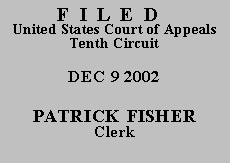

| UNITED STATES OF AMERICA,
Plaintiff - Appellee, v. LEONARD SHYRL BROWN, Defendant - Appellant. |
Nos. 02-4019 and 02-4095 D.C. No. 2:00-CR-538-B |
After examining the briefs and appellate record, this panel has determined unanimously that oral argument would not materially assist the determination of this appeal. See Fed. R. App. P. 34(a)(2); 10th Cir. R. 34.1(G). The case is therefore ordered submitted without oral argument.
In case No. 02-4019, defendant Leonard Shyrl Brown appeals his conviction of conspiracy to defraud the United States, in violation of 18 U.S.C. § 371, and mail fraud, in violation of 18 U.S.C. § 1341. In case No. 02-4095, he appeals the district court's denial of his motion for release pending appeal. We exercise jurisdiction pursuant to 28 U.S.C. § 1291 and affirm.
On November 15, 2000, Brown, his son, and his daughter-in-law were indicted for violations of the Internal Revenue Code. Brown pled guilty to two charges conspiracy to defraud the United States and mail fraud. The district court denied several motions filed by Brown, including his motion to withdraw his plea. In accordance with his plea agreement, he was sentenced on January 22, 2002, to a thirty-month term of imprisonment. Brown's court-appointed attorney has filed a brief pursuant to Anders v. California, 386 U.S. 738 (1967), and a motion to withdraw. Brown has also filed a pro se appellate brief in each case.
Brown filed his motion to withdraw his plea based on his assertion that he did not understand that by entering a guilty plea he was giving up his right to a jury trial. We review the district court's denial of a motion to withdraw a guilty plea for an abuse of discretion. United States v. Siedlik, 231 F.3d 744, 748 (10th Cir. 2000) ("[U]nless it is shown that the trial court acted unjustly or unfairly, there is no abuse of discretion. It is within the sound discretion of the trial court to determine what circumstances justify granting such a motion."). The district court found that Brown's plea was knowingly and voluntarily made and that it was supported by Brown's admission of guilt.
We have reviewed the entire record on appeal, as well as Brown's appellate filings, and conclude that the district court did not abuse its discretion in denying his motion to withdraw his guilty plea. Additionally, we find no merit to Brown's remaining arguments on appeal. His contention that the district court lacked jurisdiction is frivolous. See 18 U.S.C. § 3231 (vesting federal district courts with jurisdiction over "all offenses against the laws of the United States"); United States v. Collins, 920 F.2d 619, 629 (10th Cir. 1990) (stating efforts to argue that federal jurisdiction does not encompass prosecutions for federal tax evasion have been rejected as "frivolous"). Further, Brown's assertions regarding inclusion of a charge based upon 18 U.S.C. § 287 in the indictment are irrelevant because the § 287 charge was dismissed in exchange for his guilty plea. With regard to the district court's denial of Brown's request for release pending appeal, the court did not err. Brown did not "raise[] a substantial question of law or fact likely to result in (i) reversal, (ii) an order for a new trial, (iii) a sentence that does not include a term of imprisonment, or (iv) a reduced sentence to a term of imprisonment less than the total of the time already served plus the expected duration of the appeal process." 18 U.S.C. § 3143(b)(1)(B).
AFFIRMED. Counsel's motion to withdraw is GRANTED. All pending motions are DENIED.
Entered for the Court
Mary Beck Briscoe
Circuit Judge
*.This order and judgment is not binding precedent, except under the doctrines of law of the case, res judicata, and collateral estoppel. The court generally disfavors the citation of orders and judgments; nevertheless, an order and judgment may be cited under the terms and conditions of 10th Cir. R. 36.3.